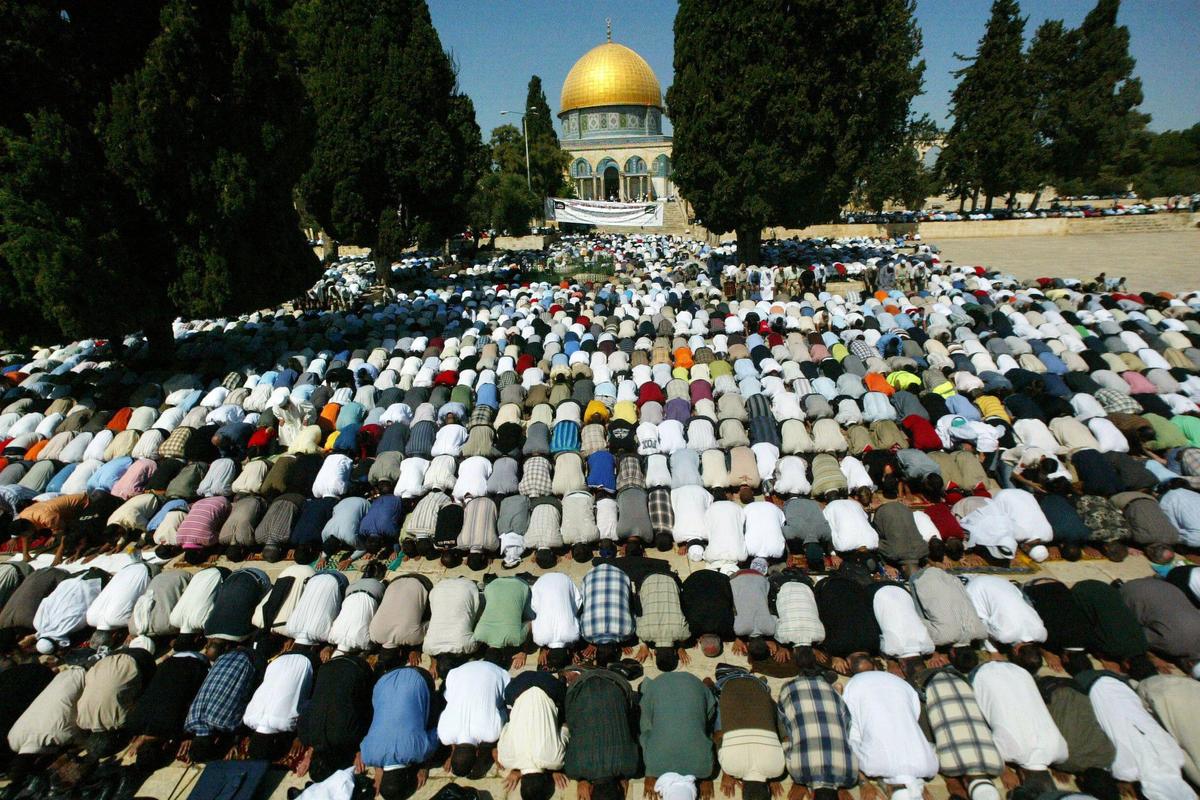A prominent Israeli orthodox rabbi has charged that the deadly violence sweeping Israel and Gaza will not be resolved by military might because the core of the unrest is over Jerusalem’s ancient mosque and ultimately respect for religion.
“People around the world don’t understand; commentators think we can ‘win’, but this is about al-Aqsa,” says Rabbi Michael Melchior, a former deputy foreign minister who works with regional Jewish, Islamic and Christian leaders on rights, nonviolence and conflict resolution.
“When Israeli police trample into al-Aqsa with boots and stop one of the holiest prayers, it is one of the gravest transgressions of Islam,” Melchior says. “This you don’t do.”
Roughly three billion Muslims worldwide, including around seven million in Israel, the West Bank and Gaza revere al-Aqsa, one of Islam’s holiest sites. The seventh-century mosque in Jerusalem’s Old City sits on a plateau that Muslims call Haram al Sharif and Jews venerate as The Temple Mount.
Melchior, whose proposed bill in 2007 to protect Muslim and Christian holy sites did not pass, spoke to The Art Newspaper as Hamas rockets fell across Israel in the background, sending families racing to bomb shelters, and as Israeli air strikes devastated Gaza, where there are no shelters.
“We can only solve it through religious peace.”Rabbi Michael Melchior
By this morning, at least 119 Palestinians were killed, including 31 minors; and at least seven Israelis had been killed, including two children, one a Bedouin Muslim. Jewish and Palestinian citizens across Israel have also been attacking each other and each other’s property. One Arab citizen was killed in riots. Synagogues and a Muslim cemetery in Lod were damaged, and the Lod Mosaic Museum and several historic buildings in the Unesco recognised Old City of Akko, including the International Conservation Center built with support of the Italian government, were also damaged by mobs.
The unrest escalated after Hamas filled a vacuum, Melchior says. Hamas “saw the chance to move into the religious sphere. They could be the protectors of al-Aqsa because of our police and government who didn’t understand what they were doing, so Hamas becomes the protector, winning over the people.”
“There is nobody to talk to,” Melchior says. “We will try in a few days. You can kill leaders and have military operations but there is no such thing as deterrence—these are people who do not have options and deterrence is for people with options. This is the tragedy because there is so much suffering on both sides and Israel’s government can’t permit rockets falling on civilians. That’s why you need to change the equation—not by bombing. We can only solve it through religious peace.”
The missiles fired on Israel by Hamas and its allies and subsequent Israeli air strikes followed weeks of clashes between Palestinian Muslim residents of Jerusalem and Israeli police at three sites in and around Jerusalem’s Old City.
Palestinians said they felt disrespected during the Muslim holy month of Ramadan as Israeli police set up “crowd control” barriers preventing families from congregating by Jerusalem’s ancient Damascus Gate at the entrance to the Old City’s Muslim Quarter.
Nearby in the Palestinian east Jerusalem neighbourhood of Sheikh Jarrah, Palestinian and Jewish activists protested against impending evictions of several Palestinian families. Israel’s Supreme Court delayed its ruling after the attorney general requested help calming the situation. But the two decades of proceedings underscore the differing rights based on religion: Jews who owned property in east Jerusalem before the 1948 war can petition for Palestinians refugees settled there by Jordan in the 1950s to be evicted, while Palestinian Muslims and Christians have never been granted rights to their pre-war properties in Jerusalem or Israel.
During the demonstrations, tens of thousands of Muslims made their way to Ramadan prayers and activities at the al-Aqsa complex. Israeli police, saying Palestinians were throwing stones, stormed the building and courtyard on Monday with stun grenades and rubber-tipped bullets. Over 200 Palestinians and several officers were injured. Today, armed police clashed again with Muslim visitors.
Sheikh Imad Falogi, a former Hamas official in Gaza and close colleague of Melchior, says Muslims have no problem with people of the Jewish religion but feel disrespected by Israeli police and throngs of ultranationalist Israelis who visit al-Aqsa and are seen not as engaging in holy activities but as trying to take over “and create problems with Muslims.”
On Wednesday, Israel destroyed a high-rise building saying it targeted Hamas leaders. The building also housed the Adam Center for Dialogues of Civilizations in Gaza that Falogi heads. The office, he explains, was the Gaza base for dialogue with spiritual leaders about rights, building trust and a path to inter-religious peace on both sides. “All of us must respect the other,” Falogi says. “Even some leaders in Hamas understand our plan to build communication and trust between the three religions in the Holy Land—and speak about rights.”
When there are political problems, Falolgi adds, “the politicians should come to the rabbis and imams.”
Other Jewish, Muslim and Christian religious leaders in Israel, the West Bank and Gaza have also been calling for nonviolence and mutual respect.


